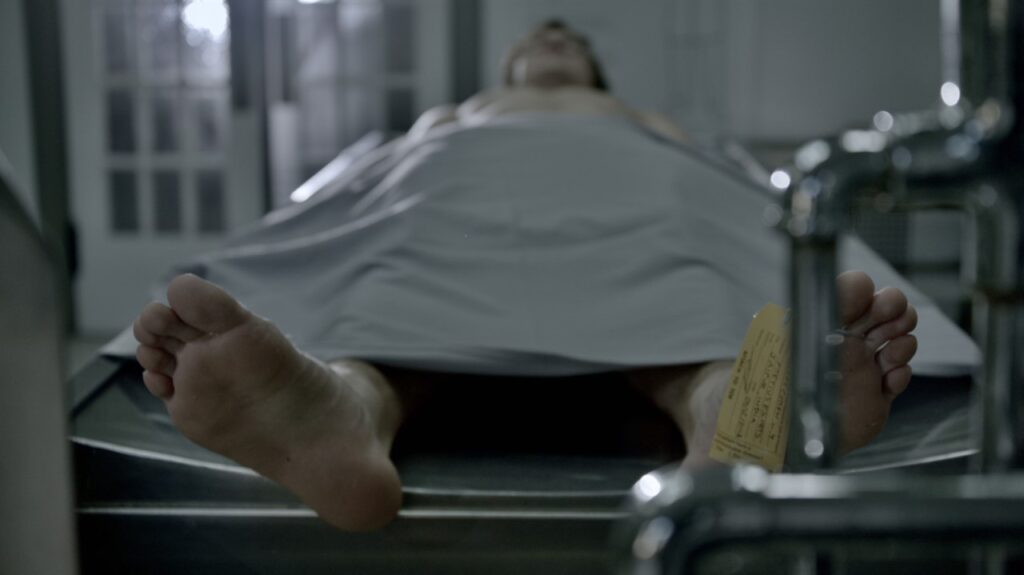Sheona McDonald is an an award-winning filmmaker who worked in the Canadian film and television industry as a writer, producer, and director for over two decades. Her recent films include “Into Light,” “Candice,” “A short Essay on Men,” and “Inside Her Sex.” McDonald also directed Season 2 of “Emergency Room: Life and Death” at VGH for Knowledge Network. Her dramatic feature film script, “Back By Midnight,” was recently optioned by Christine Haebler of Screen Siren Pictures. McDonald is currently writing her first novel.
“Dead Man’s Switch: a crypto mystery” is screening at the 2021 Hot Docs Canadian International Documentary Film Festival, which takes place April 29-May 9. The fest is digital this year due to COVID-19. Streaming is geo-blocked to Canada.
W&H: Describe the film for us in your own words.
SM: “Dead Man’s Switch” is a feature length documentary that explores the mysterious, twisted, and unregulated world of cryptocurrency through the story of the rise and fall of the Canadian cryptocurrency exchange QuadrigaCX and the mysterious death of its CEO and founder, Gerald Cotten.
This is a tech film, a mystery film, and a crime film. It is a film about shadows and perceptions, supposition and greed.
W&H: What drew you to this story?
SM: Two-fold. I had been tasked with pitching a film about cryptocurrency a year before Gerald died and was challenged to find a story about crypto that was engaging enough to maintain my interest long-term — to tell a story that would intrigue an audience, and a story that had some value. When it was reported that Gerry died and money was missing, I knew immediately that this was the story I had been tasked to tell.
W&H: What do you want people to think about after they watch the film?
SM: I want people to explore their own ideas about loss, greed, money, technology, investment, risk, and reward. Hopefully they are entertained, a little better versed about crypto, and full of opinions and speculation about what actually happened to Gerry Cotten.
W&H: What was the biggest challenge in making the film?
SM: The greatest challenge was figuring out — without having access to the people I was making a film about — who would tell the story and how. Also, how to educate the viewer about cryptocurrency, while also balancing the story of QCX and Gerry.
W&H: How did you get your film funded? Share some insights into how you got the film made.
SM: We were very fortunate to have the Canadian Broadcasting Corporation’s (CBC) documentary channel on board from the get-go. So, I had some pre-development money available through the doc channel and the Canada Media Fund. Once we did development and figured out we were moving forward with the project, I also received financial support from several other agencies and organizations. There was a five percent producer contribution as well.
W&H: What inspired you to become a filmmaker?
SM: I am curious about people and invested in understanding perspectives or experiences that are not my own. I like people and am driven to understand what makes them tick, what lies beneath facades, how we are all similar and all different.
Truth be told, I hoped, early on, to tell stories that made a difference, that educated and informed and shed light in dark places. I’ve mellowed as I’ve aged and now try and focus on “good projects with good people.”
W&H: What’s the best and worst advice you’ve received?
SM: A challenging question. There’s lots of bad advice out there, but I think the two pieces of good advice I would offer as things I adhere to: “Trust your gut” and “Know what you don’t know.”
The latter has been particularly important to me over the last few years as I’ve gotten older. When I was younger, I think I thought I knew everything, or a lot, and therefore didn’t seek out those who were experts or knew better. Now, if I’m not great at something or don’t know something, I try and find someone who does.
W&H: What advice do you have for other women directors?
SM: There’s so much noise right now about who can tell stories and what stories they can tell. Tell a story that’s important to you, from your own unique perspective. Bring yourself to the process, trust your process.
W&H: Name your favorite woman-directed film and why.
SM: Too many great films. Too many women doing great work.
W&H: How are you adjusting to life during the COVID-19 pandemic? Are you keeping creative, and if so, how?
SM: COVID-19 has certainly been a disruptor! Creatively, it’s been a prolific time for me personally. I finished this film despite the pandemic, and I also finished a short film called “Into Light” that is also being released and will play at Hot Docs and DOXA. I have a feature film script that I’ve been working on for a few years that has been optioned recently and, out of curiosity, in January I decided to write a novel. I’m 17 chapters in, and have three more to go. Keeping creative hasn’t been the challenge — monetizing the creative might prove more difficult.
W&H: The film industry has a long history of underrepresenting people of color onscreen and behind the scenes and reinforcing — and creating — negative stereotypes. What actions do you think need to be taken to make Hollywood and/or the doc world more inclusive?
SM: We need to make room. Room for diverse voices. Room for people of color and other traditionally marginalized storytellers — writers, actors, producers, directors, and far beyond — to share their voices, their perspectives, their ideas, their lives.
Recognizing this need and becoming inclusive in hiring practices and funding protocols are good first steps, but we need to go further. We need to collaborate better, we need to increase funding for BIPOC projects, and we need to watch and support productions that are unique and offer different perspectives.







